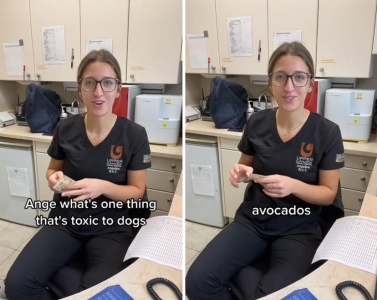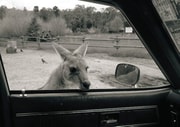Vet staff expose toxic food ingredients for dogs in viral video—What NOT to feed!
As dog lovers ourselves, we know just how important keeping our beloved pets healthy and safe is to our lovely members at the Seniors Discount Club. And, while we treat our furry friends like royalty, we sadly can't share all our favourite foods with them—no matter how much they might beg.
In an eye-opening video that recently went viral, staff at the Upper Canada Animal Hospital has done us pet owners an important service by sharing a surprising list of common household foods that are toxic to our four-legged companions.
The video features an employee going around the clinic, candidly asking their colleagues, 'What's one thing that's toxic to dogs?'

To many pet owners' astonishment, the list of foods to avoid included:
1. Avocados
2. Garlic
3. Grapes
4. Onions
5. Chocolate
6. Ibuprofen
7. Xylitol (a natural sugar-free sweetener found in chewing gums, gelatin snacks, sauces, toothpaste, and more)
According to the helpful vets, some of these toxic ingredients can have severe effects on our pets. Garlic and onions, for instance, can harm dogs by causing oxidative damage to red blood cells, leading to nasty symptoms such as nausea, abdominal pain, drooling, vomiting, and diarrhoea.
Meanwhile, the toxin persin, found in avocados, rarely affects dogs. However, the larger risk is a foreign body obstruction in the oesophagus, stomach, or intestinal tract if a dog swallows part or all of an avocado seed.
Turning to medicine, ibuprofen—a non-steroidal anti-inflammatory drug used by humans—can be incredibly harmful to dogs, as they are quite sensitive to its chemical composition.
We all know chocolate is a no-no, but it's important to remember that the risk varies greatly depending on the type and amount consumed, as well as the size of the dog. Darker, less sweet chocolate is more toxic to dogs than lighter varieties.
Lastly, xylitol—a seemingly innocent sugar substitute—can be life-threatening to dogs, causing rapid drops in blood sugar levels and even acute liver failure.
Ending the video with caution, the employee advised pet owners to 'do research before giving your dog new foods and contact your veterinarian if they get into something they shouldn't have’.
Watch the video here:
It is important to note that puppies and older dogs may be more susceptible to food poisoning as they have weaker immune systems. If your dog is displaying any of the above symptoms, contact your veterinarian immediately for advice and treatment. Early diagnosis and prompt medical intervention can help reduce the severity of the symptoms and prevent further illness in your pet.
 Sharing such vital information is a reminder of just how important it is to be knowledgeable and vigilant about our pets' well-being. If you or someone you know has a dog, please spread the word and help keep our beloved companions healthy and safe from harm.
Sharing such vital information is a reminder of just how important it is to be knowledgeable and vigilant about our pets' well-being. If you or someone you know has a dog, please spread the word and help keep our beloved companions healthy and safe from harm.
Remember, it's always better to consult with a vet, research, or refer to reputable sources to gain accurate and up-to-date information on dog care. Because, after all, our furry friends deserve nothing but the best!
Members, we'd love to hear your feedback on this article. Did you gain any new insights or knowledge from it? Please share your thoughts with us!
In an eye-opening video that recently went viral, staff at the Upper Canada Animal Hospital has done us pet owners an important service by sharing a surprising list of common household foods that are toxic to our four-legged companions.
The video features an employee going around the clinic, candidly asking their colleagues, 'What's one thing that's toxic to dogs?'

Veterinary experts have unveiled the unexpected ingredients deemed 'toxic' for dogs. Source: ucahteam/TikTok.
To many pet owners' astonishment, the list of foods to avoid included:
1. Avocados
2. Garlic
3. Grapes
4. Onions
5. Chocolate
6. Ibuprofen
7. Xylitol (a natural sugar-free sweetener found in chewing gums, gelatin snacks, sauces, toothpaste, and more)
According to the helpful vets, some of these toxic ingredients can have severe effects on our pets. Garlic and onions, for instance, can harm dogs by causing oxidative damage to red blood cells, leading to nasty symptoms such as nausea, abdominal pain, drooling, vomiting, and diarrhoea.
Meanwhile, the toxin persin, found in avocados, rarely affects dogs. However, the larger risk is a foreign body obstruction in the oesophagus, stomach, or intestinal tract if a dog swallows part or all of an avocado seed.
Turning to medicine, ibuprofen—a non-steroidal anti-inflammatory drug used by humans—can be incredibly harmful to dogs, as they are quite sensitive to its chemical composition.
We all know chocolate is a no-no, but it's important to remember that the risk varies greatly depending on the type and amount consumed, as well as the size of the dog. Darker, less sweet chocolate is more toxic to dogs than lighter varieties.
Lastly, xylitol—a seemingly innocent sugar substitute—can be life-threatening to dogs, causing rapid drops in blood sugar levels and even acute liver failure.
Ending the video with caution, the employee advised pet owners to 'do research before giving your dog new foods and contact your veterinarian if they get into something they shouldn't have’.
Watch the video here:
Signs of Food Poisoning in Dogs
It is imperative to be aware of the signs of food poisoning in dogs in order to provide prompt treatment in the event of contamination. Symptoms of food poisoning can vary but typically include vomiting, diarrhoea, loss of appetite, abdominal pain, and possible bloody faeces. If your dog has ingested something toxic, they may also display signs of lethargy, weakness, incoordination, and dehydration.It is important to note that puppies and older dogs may be more susceptible to food poisoning as they have weaker immune systems. If your dog is displaying any of the above symptoms, contact your veterinarian immediately for advice and treatment. Early diagnosis and prompt medical intervention can help reduce the severity of the symptoms and prevent further illness in your pet.
Key Takeaways
- A team of vets from Upper Canada Animal Hospital created a video revealing the surprising ingredients that are toxic to dogs.
- The list of toxic ingredients includes avocados, garlic, grapes, onions, chocolate, ibuprofen, and xylitol—a natural sugar-free sweetener found in various products.
- These toxic foods can cause various adverse health effects in dogs, such as oxidative damage to red blood cells, foreign body obstruction, low blood sugar, acute liver failure, and kidney failure.
Remember, it's always better to consult with a vet, research, or refer to reputable sources to gain accurate and up-to-date information on dog care. Because, after all, our furry friends deserve nothing but the best!
Members, we'd love to hear your feedback on this article. Did you gain any new insights or knowledge from it? Please share your thoughts with us!







